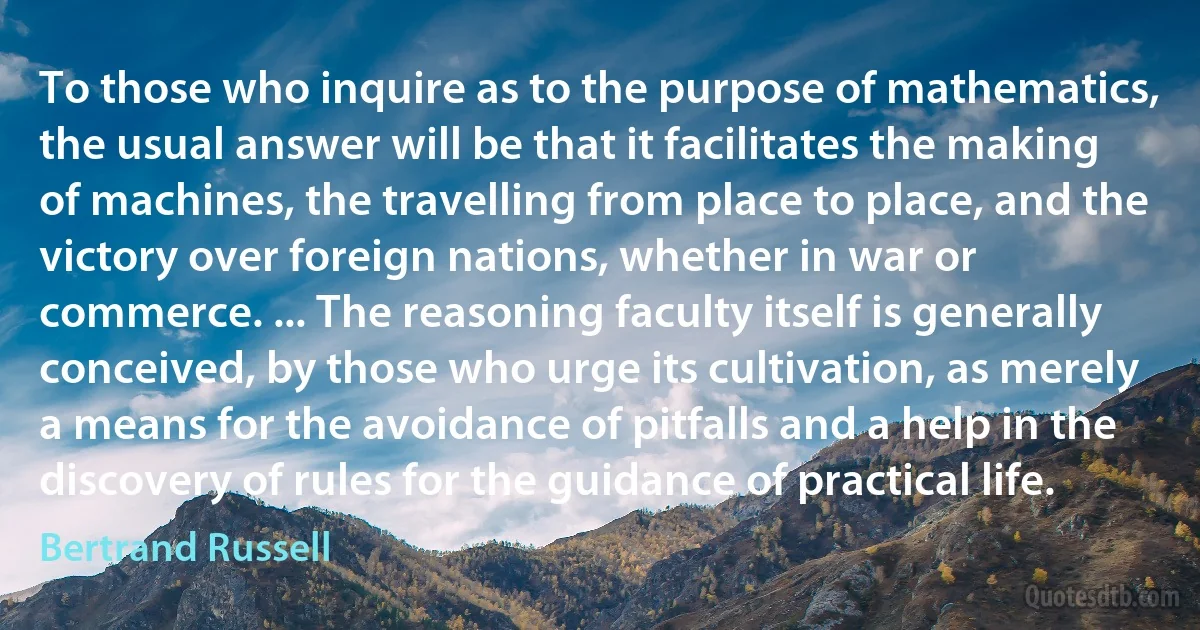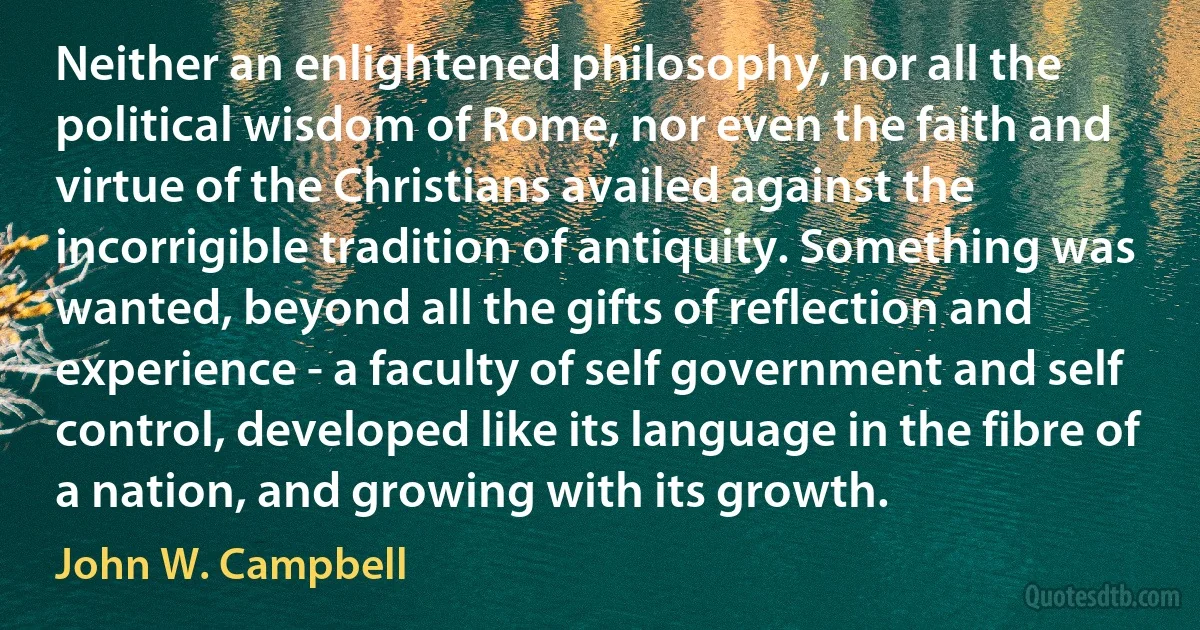Faculty Quotes - page 7
The absolute rights of man, considered as a free agent, endowed with discernment to know good from evil, and with power of choosing those measures which appear to him to be most desirable, are usually summed up in one general appellation, and denominated the natural liberty of mankind. This natural liberty consists properly in a power of acting as one thinks fit, without any restraint or control, unless by the law of nature: being a right inherent in us by birth, and one of the gifts of God to man at his creation, when he endowed him with the faculty of freewill. But every man, when he enters into society, gives up a part of his natural liberty, as the price of so valuable a purchase; and, in consideration of receiving the advantages of mutual commerce, obliges himself to conform to those laws, which the community has thought proper to establish.

William Blackstone
The importance of the lesson which this Society was formed to teach would be hard to overestimate. Its main purpose is to impress upon the people the necessity for reverence. This is the beginning of a proper conception of ourselves, of our relationship to each other, and our relationship to our Creator. Human nature cannot develop very far without it. The mind does not unfold, the creative faculty does not mature, the spirit does not expand, save under the influence of reverence. It is the chief motive of an obedience. It is only by a correct attitude of mind begun early in youth and carried through maturity that these desired results are likely to be secured. It is along the path of reverence and obedience that the race has reached the goal of freedom, of self-government, of a higher morality, and a more abundant spiritual life.

Calvin Coolidge
The faculty of moral will, developed in the child, is a new element of his nature. It is a new power brought upon the scene, and a ruling power, delegated from Heaven. Never was a human being sunk so low that he had not, by God's gift, the power to rise. Because God commands him to rise. it is certain that he ran rise. Every man has the power, and should use it, to make all situations, trials, and temptations instruments to promote his virtue and happiness; and is so far from being the creature of circumstances, 'that he creates and controls them, making them to be all that they are, of evil or of good, to him as a moral being.

Albert Pike
André Weil suggested that there is a logarithmic law at work: first-rate people attract other first-rate people, but second-rate people tend to hire third-raters, and third-rate people hire fifth-raters. If a dean or a president is genuinely interested in building and maintaining a high-quality university (and some of them are), then he must not grant complete self-determination to a second-rate department; he must, instead, use his administrative powers to intervene and set things right. That's one of the proper functions of deans and presidents, and pity the poor university in which a large proportion of both the faculty and the administration are second-raters; it is doomed to diverge to minus infinity.

Paul Halmos
It is not the pleasure of curiosity, nor the quiet of resolution, nor the raising of the spirit, nor victory of wit, nor faculty of speech ... that are the true ends of knowledge ... but it is a restitution and reinvesting, in great part, of man to the sovereignty and power, for whensoever he shall be able to call the creatures by their true names, he shall again command them.

Francis Bacon
Accidents in the mountains are less common than in the lowlands, and these mountain mansions are decent, delightful, even divine, places to die in, compared with the doleful chambers of civilization. Few places in this world are more dangerous than home. Fear not, therefore, to try the mountain-passes. They will kill care, save you from deadly apathy, set you free, and call forth every faculty into vigorous, enthusiastic action. Even the sick should try these so-called dangerous passes, because for every unfortunate they kill, they cure a thousand.

John Muir
Others ... are in the habit of teaching that religion and philosophy are really the same thing. Such a statement, however, appears to be true only in the sense in which Francis I is supposed to have said in a very conciliatory tone with reference to Charles V: ‘what my brother Charles wants is also what I want', namely Milan. Others again do not stand on such ceremony, but talk bluntly of a Christian philosophy, which is much the same as if we were to speak of a Christian arithmetic, and this would be stretching a point. Moreover, epithets taken from such dogmas are obviously unbecoming of philosophy, for it is devoted to the attempt of the faculty of reason to solve by its own means and independently of all authority the problem of existence.

Arthur Schopenhauer
Lincoln had a wonderful faculty for understanding the topography of a country, and he was quite familiar with the one in which the army was about to operate; he carried a small chart in his pocket, on which were marked all the rivers and hills about Richmond, with the city itself, and the different points where General Lee had his forces posted, the lines of defense, and, in fact, all the information that a general of an army wanted. During our rides which were always within the lines he would stop and spread out his chart on his knees and point out to me what he would do if he were the general commanding, taking good care, at the same time, never to interfere in any way with General Grant, whom, I rather think, he considered the better strategist of the two.

David Dixon Porter
One question may possibly have dwelt in the reader's mind during the perusal of these observations, namely, Why should not the Deity have given to the animal the faculty of vision at once? ... Why resort to contrivance, where power is omnipotent? Contrivance, by its very definition and nature, is the refuge of imperfection. To have recourse to expedients, implies difficulty, impediment, restraint, defect of power. ... amongst other answers which may be given to it; beside reasons of which probably we are ignorant, one answer is this: It is only by the display of contrivance, that the existence, the agency, the wisdom of the Deity, could be testified to his rational creatures.

William Paley
The greatest danger to good computer science research today may be excessive relevance. Evidence for the worldwide fascination with computers is everywhere, from the articles on the financial, and even the front pages of the newspapers, to the difficulties that even the most prestigious universities experience in finding and keeping faculty in computer science. The best professors, instead of teaching bright students, join start-up companies.

Dennis Ritchie

![[I]magination... is the faculty... the common root from which science and literature... spring and grow and flourish together. ...the great ages of science are the great ages of all the arts... [P]owerful minds have taken fire from one another... without asking... to tie their imagination to falling balls or a haunted island. ...When Galileo was looking through his telescope at the moon, Shakespeare was writing The Tempest and all Europe was in ferment, from Johannes Kepler to Peter Paul Rubens, and from the first table of logarithms by John Napier to the Authorized version of the Bible. (Jacob Bronowski)](https://cdn.quotesdtb.com/img/quotes_images_webp/72/jacob-bronowski-asking-bible-422572.webp)

